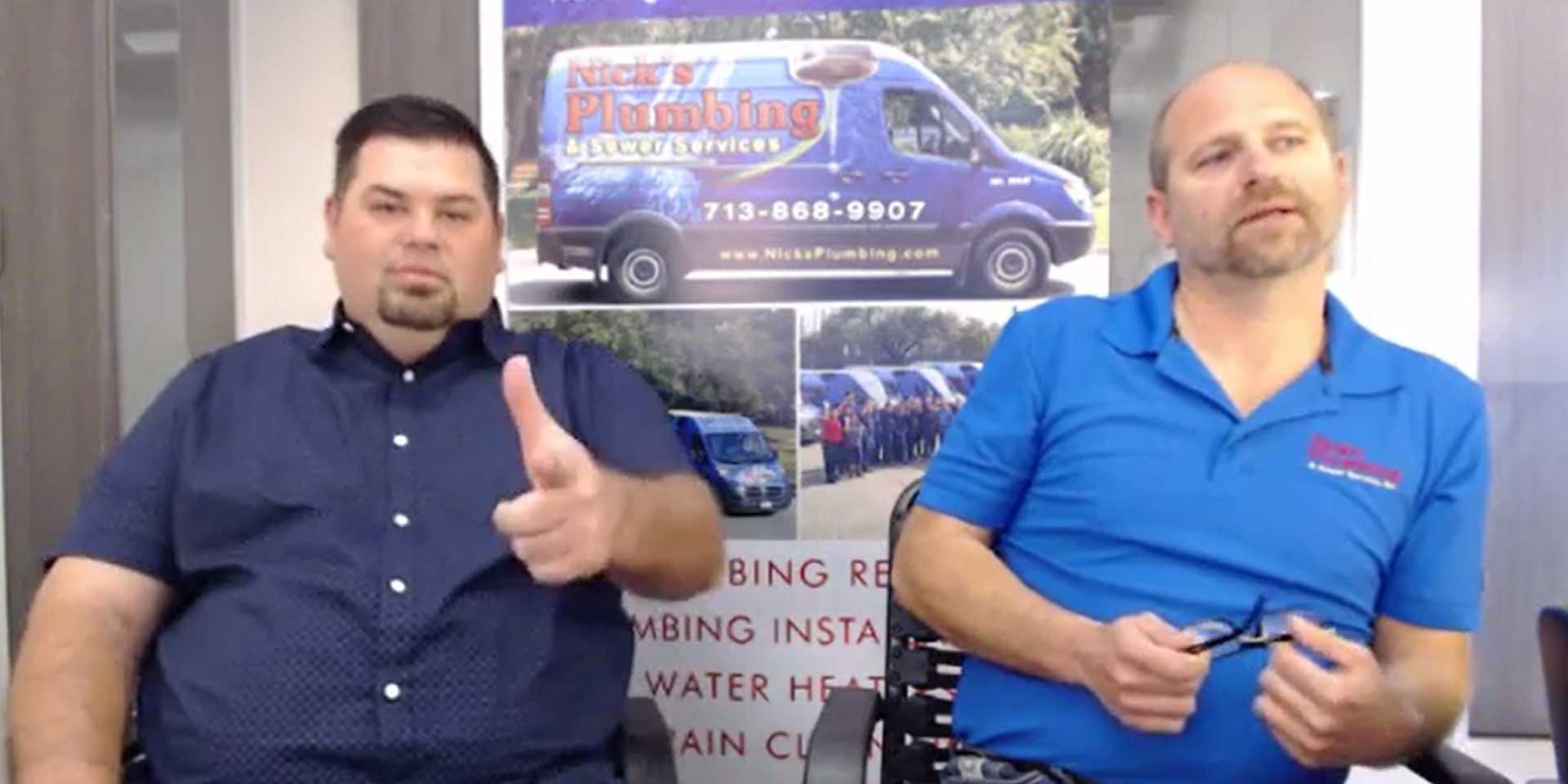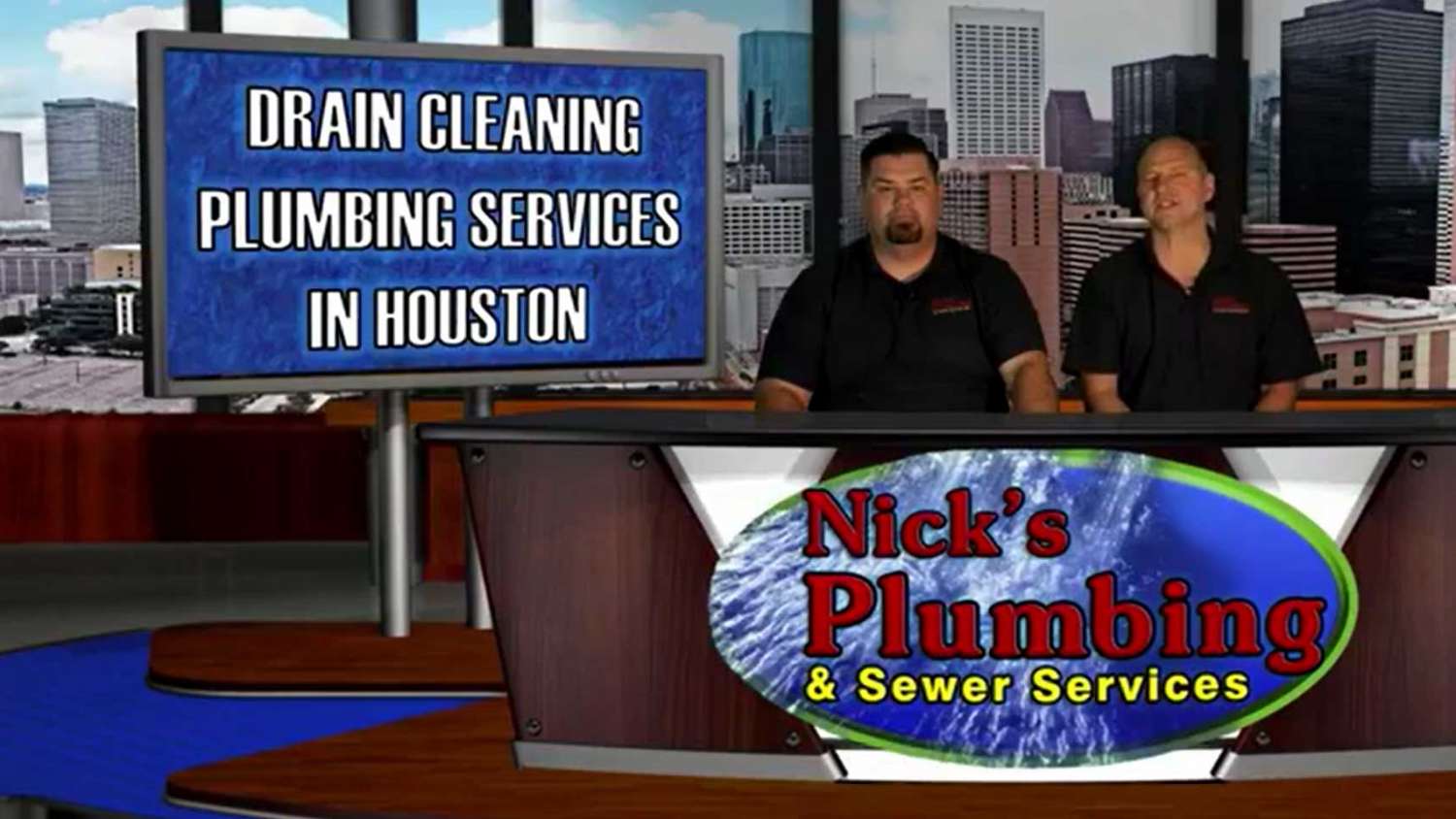Nick's Plumbing & Air Conditioning Live Video Transcription:
What creates a banging noise in my house?u00a0Question pipe is rattling from Tiffany. So, Richard, I’ll let you take that one. I’ve never even heard of that before.
Haven’t known this 20 years. I’m not a. No, I’m just kidding. This is a common occurrence. Um, and this happens a lot more than what you guys think. What it is is basically, in simplistic terms is a hard shut off. So when you’re in the kitchen, somebody in the bathroom and you hear a banging noise that’s a pipe that’s reverberating through the attic and creating that noise and hitting against wood, um, so how, how does that kind of look and how do you, how do you fix that? I mean, that’s a complicated scenario. Pipes banging in the, in the attic and creating that banging noise. And again, it’s due to a hard shut off. So what creates a hard shut off? That’s what you’ve got to figure out. First Dishwasher, a washing machine, um, ice maker could create that. Roman tub faucets are notorious for that because they run a high volume of water in a big tub.
Absolutely. And then when you shut that off quickly yourself, instead of it automatically shutting off like a washing machine, you’ll create it doing that or could. So what’s the solution for that? Um, there’s a few, there’s not just a standard answer. Um, they, you can go install what they call water hammers, and those hammers are basically extra piping that you put into the system. And that will, it’s an air chamber that will allow it to go up into that chamber and not reverberating, reverberate through the piping system. No. Another one that could be creating it is a rubber garment in either a hose bib outside or a faucet that you’re using is allowing that water to vibrate, um, or a toilet and it’s allowing that water to vibrate and it’s shaking the pipe and the attic as well. So it’s, it’s a process of elimination, and you basically have to turn everything off in the house, and you start with one item at a time.
But we’ve been doing it a long time, so we pretty much know. So we might not shut off everything in the house. We might start testing a different way. But if you’re going to do it as a homeowner, you want all the shut-off valves off in the house, and then you open one up and then you just start testing it that way. And if that’s not creating it, then you leave that one on. You go to the next one, and you turn that one on, on in and do that until you can recreate that scenario.
Then you figure out how to fix it. Once you figure out which ones creating that. Anything you want to add? I think you hit the nail on the head it water hammer. The second question comes from Kelly.u00a0When I go on vacation, should I turn the water off to my house?u00a0OK. I’m with you. It’s not a necessity. It’s really not. You don’t have to, but I will tell you from a personal experience that’s happened to me probably about 15 years ago, right? I go on vacation just a little weekend trip. Nothing major. Um, I come home and the supply line under my kids a lavatory had burst. So I came home to. That’s expensive. Yep. Yep. I had to call my insurance company to a lot of water and responsive. Uh, it was not a fun situation. Hey, guess what? This is what people don’t know when that happens.
If you had a company, let’s call it like a handyman and not a professional plumbing company, do that install. Don’t get denied; you could easily get denied on that insurance claim. Absolutely. And people don’t know that how important it is to use a professional plumbing company. You know, the state of Texas, this is not an option. It’s a requirement that we have all these licenses along with all these different types of insurance. So you’re covered, and the insurance company will look for that. So they’re going to figure out, OK, who, who installed that supply line because they, of course, don’t want to pay for it. And then if you can’t prove up who installed the supply line, it’s going to be a fight. Or at least it could be. You know, I’ve seen insurance companies deny it if you didn’t have an invoice proving up who put it in, but it’s been in for 20 years.
Mr. Insurance, I don’t know. Well, there’s your argument. Yeah, sometimes they do, sometimes they don’t, but continue. So it’s not a necessity. You don’t have to do it. Um, but for our peace of mind, depending on the length of your stay that you’re going to be away, it’s not a bad idea. And it’s really simple to do. Um, the only thing that you need to know is where is the main water shut off to the house, which is normally located on your main water. If you don’t find it there, you can even go out to the water meter and started off there about shutting it off at the stop. Yeah. Or at the stop sign. The lab of, in each individual one. Once you shut it off, um, you can, you can drain it if you want. Dependent again on how long you’re going to be away you can drain the system.
We’re talking about the water bursting underneath the laboratory still. The whole entire system. So you can drain the system to an outside the hose bib to get all the cold water out just in case something does happen. Uh, because, uh, unfortunately it does. You know, I was a victim of it. Um, I’ve actually had a friend that kind of had the same situation. Um, but that can save you a lot of things if you don’t know where they’ll shut offs are and you want to know where they are very easily, you can call us and we can send someone out to take it in a matter of fact that you owe once our vip thing, we don’t have it up, but our vip membership actually includes that. So if you want to call them some information about that, but we can definitely help you locate your main water shutoff.
So you’re prepared. We actually had this hit close to home. We had one of our, um, senior level technicians that this happened to his toilet, um, supply line broke now. They weren’t out of town, but the toilet supply line broke on the upstairs and it ran for six hours on a 50 pound waterline and did about 80 grand worth of damage. That was really. And that can happen, but it can happen whether we’re in town or out of town, but when we go out of town, um, personally I think it is important, especially if you have an older home. Piping hasn’t been updated. You haven’t changed out your supply lines in 15, 20 years. It is a good idea because they do get weak and then saying that what you guys need to think about is you do need to replace those shutoffs and supply lines about every 10 years and if you do that, maybe you don’t need to shut the water off to the house, but it’s always a good idea, especially when you’re a material is old to shut off that house before you go out of town.
What is. What is an easy way for customers to get that checked out? Well, can assure us and pushing for a little plug right here. You’re going to hire us, right? Do we? Do we offer this service? Absolutely we do. Yeah. We do inspections all the time the VIP plan. You get the whole house inspection. We’ll come out. We’ll make sure that you’re not facing one of those potential dangers. Plus you get all sorts of benefits. Ten percent off of any repairs. Priority Service, extended warranties, so it’s, it’s a good little deal. Just give us a call at the office. We can get you set up.
So third question of the day, right? Coming from Timmy.u00a0Timmy wants to know what are the benefits, what are the benefits between the tank versus tankless water heaters?u00a0He’s heard a lot of talk about the tankless. A matter of fact we had a conversation a little bit back and forth, so he wants to know what are the true benefits of the tankless versus the tank. Well, we could go on for an hour. Yeah, let’s just give them the top and again I’ve conversating with him when I saw this question come in a few times, but I thought it was worthy of getting it on the air to tell someone about those. So let’s just hit the top two or three things. So I’m just going to do the bullets bulleted.
I’m on a bullet in the gun. OK, so tanks or a vessel or a vessel in Texas, most of them go into the attic. The issue with that is none of our material lasts forever, including vessels. So eventually this thing is going to, uh, give out and when it gives out, it’s not going to be pretty. When it is in the attic, most of the time that pan cannot retain the water, then it starts releasing out of that vessel, especially with too big of a parent. And you want to think about a $60,000 problem real quick. That could happen real quick. Absolutely. Especially in these, all these new three story jobs around here. So the water heater’s actually in the fourth story. Um, so what a tankless does is it gets rid of that vessel. It is an on demand system. So you’re taking a vessel with 40, 50 gallons worth of water in it, completely doing away with that.
And you’re putting a pass-through system in because all it isn’t a tankless unit is just piping, so the water’s rushing through that piping as the burner is fired up and it’s heating the water to that temperature you’re demanding and then delivering it to your shower faucet or kitchen or wherever you are. A demanding that. Um, what about life expectancy? Life expense expectancy is a big one. Manufacturer’s a, according to Houston is north of 20 years. And what I tell people is if you put a descaling system on the entire house or a point of use descaler for that unit, you’re going to get a lot more than that compare to a tank unit thinking that you’re going to get averaging Houston [inaudible]. You need to throw them away at 10 no matter what. Because remember, it’s a vessel. It’s holding that water for 10 years of eventually something is going to give out.
Right, right. They need to make sure they’re maintained. Yeah. But yeah, I love the tankless unit. I think they’re great. You know, they are, they’re efficient. You’re not. Your burner is not burning all the time. It’s an on demand system on that tank unit. When you and I are at work, it’s firing up and down all day. Yeah. That’s the hair all day on that system. So I’m a big fan. I’ve had a tankless in my house for let’s, it’s 12 years now. I wouldn’t do without one. Just the last one burst. No. Yeah. Well, yeah, that’s what my, my tank row. And I was actually excited that my tank broke when my tank broke. It was only six. Wow. Yeah. And when it broke really bad, um, I mean like, I don’t know if I’ve seen one that was worse than this, but it was bad and I’m so 12 years ago is when I put in a tank. Listen, I have never had an issue, but of course I keep mine clean. Um, and that’s also important. You guys have to maintenance items. Uh, it’s just like your air conditioning. It’s just like your car. Those items need maintenance. So as long as you’re providing that piece of equipment, equipment maintenance, you’re going to get the life out of it.
So bullet points, tankless, efficient, endless hot water.
So I’ll give you the short version of that. If you put it in a tank water heater today, you should be maintaining it every single year after your installed date. The way that you do that is you need to drain the system, drain that vessel. I mean, and you need to take that burner assembly out and up, um, and by cleaning, meaning you, we can do that. If it hasn’t gone on too long and it’s not that dirty, you can do it with compressed there, but that’s what you need to do every single year. Now, what I would tell you not to do is if you’re taking unit is over three years old. I would not drain that tank anymore. The problem is our water in Houston is not that hard, but when you let it accumulate into it a vessel, he, your tank water heater, an extended period of time of three years that it becomes sludge and you’re going to get mineral deposits, and those deposits are going to form rocks, which you cannot get out of that system.
You’re taking a great risk when you try to drain it and you’re gonna get some slides out. You’ll get some of those mineral deposits out, but then what’ll happen is you’ll start throwing through the hot water side, a sludge and mineral deposits, and then it’ll start hitting your toilets in your faucets, and you want to talk about a problem. Then you’re going to have to call me to come in and start taking faucets apart, uh, to be able to clean these fosters, to get these rocks out of them. You don’t want to do it. That gets expensive and what we’re trying to avoid as you’re doing it yourself, so you don’t have any expense. So you guys, if your water heater is three or older, I would not drain it, but you can maintenance that burner assembly but just don’t drain it.


























